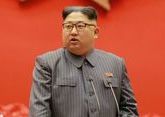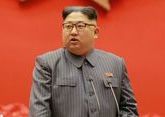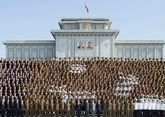The day before the start of the Olympics in South Korea, the DPRK held a military parade, which was regarded by observers as a demonstration of strength. However, not long before that, it was agreed that the national teams of North and South Koreas will participate in the Games as a united national team under one flag. This result was achieved, because only sport, but not the problems of denuclearization were discussed during the negotiations.
As United Press International writes in the article South Korea's ultimate goal: U.S., North Korea dialogue, with a reference to the South Korean diplomat, who spoke to UPI on the condition of anonymity, "so far inter-Korea talks have been limited to the Olympics," he said, adding dialogue has made progress on the condition any discussion of dismantling North Korea's nuclear weapons program remain off-limits. "But it must then move on to calls for denuclearization."
The goal is an ambitious one and is being pursued after North Korean leader Kim Jong Un announced the completion of his nuclear arsenal in his New Year's speech. Pyongyang has repeatedly claimed it has no plans to give up its weapons of mass destruction and has blamed the United States for its nuclear buildup. But between North Korea's frequent missile provocations, including the launch of an intercontinental ballistic missile, and tweets from U.S. President Donald Trump threatening "fire and fury" at "Little Rocket Man" Kim, South Korean President Moon Jae-in has persistently signaled an interest in inter-Korea dialogue and has stayed away from aggressive gestures, the diplomat said.
While fast-thawing North-South relations and athlete exchanges took the world by surprise in January, the Moon administration has been calling for formal talks since July 2017. In Berlin last year, Moon outlined his vision for inter-Korea peace and the proposal has culminated in the current détente, the South Korean official said. But the momentum of "peace" that has been building with the Winter Olympics, scheduled to begin this week in Pyeongchang, is not complete without Washington. "At the core [of the plan] is moving the United States and North Korea to talks," he said. "North-South dialogue must evolve into a U.S.-North Korea dialogue, and it is Seoul's goal to make this possible."
South Korea may be pursuing the policy of what the official describes as "expanding the space of diplomacy" when observers of U.S.-South Korea relations have said the allies are increasingly at odds with each other on North Korea and other issues. Those suspicions became more substantial after Victor Cha, the presumed nominee to the U.S. ambassadorship to South Korea, was reportedly notified that he was no longer in consideration for the post. The Trump administration has since denied steps were taken toward Cha's nomination, an announcement that has been met with stern criticism from U.S. policy analysts and the media. Cha, a leading North Korea expert who served as director of Asian Affairs at the White House National Security Council under President George W. Bush, also has extensive experience in representing the United States in Seoul.
But the South Korean diplomatic community may be taking the news in stride. Several explanations for the decision are circulating in Seoul, and they are not just limited to a possible disagreement between the White House and the nominee regarding a limited U.S. military strike against North Korea, the South Korean official said. The dropping of Cha as ambassador may be being used to "facilitate diplomacy," or, put another way, signal to North Korea that Trump and his advisers are no strangers to taking the strongest possible measures to defend the homeland, the official said. In the highest levels of government, Seoul and Washington are closely coordinating on North Korea and the alliance is being clouded by misperceptions regarding opposing viewpoints and approaches, he said.
The diplomat also said there is "great meaning" in U.S. Vice President Mike Pence's visit, and Seoul is "optimistic." The vice president, who previously accused Pyongyang of "hijacking" the Winter Olympics with its attention-grabbing moves, recently said, "We'll see what happens" regarding the possibility of meeting North Korean officials during the Winter Games. Pence then announced late Wednesday in Tokyo the United States would soon "unveil the toughest and most aggressive round of economic sanctions on North Korea" until Pyongyang gives up its weapons programs. The message is being interpreted as anti-reconciliatory, according to The Washington Post, but it is also compatible with the view held in Seoul that North Korea is agreeing to reconciliation because of economic pressure. "Kim Jong Un spoke a lot about the economy and economic benefits" during his New Year's speech, the South Korean diplomat said. "We must provide ways for Pyongyang to understand sanctions could be lifted if it pursues denuclearization.










